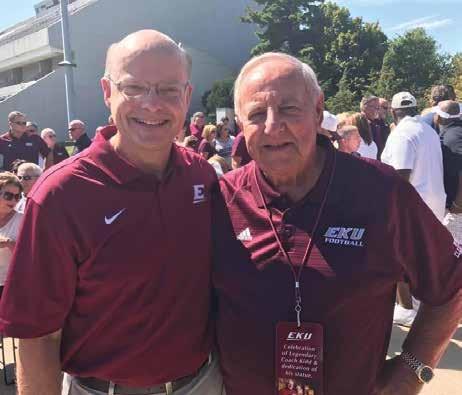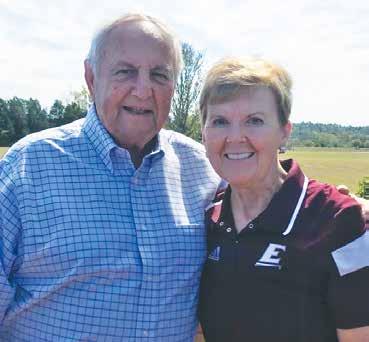
5 minute read
Father Friend Faithful
by Jerry Wallace
A PREACHER, AN ACADEMICIAN AND A HALL OF FAME COACH WALK INTO A FOOTBALL STADIUM.
FOR DECADES, IT WAS A COMMON SIGHT ON FALL SATURDAYS TO SEE REV. BILL FORT, DR. JANNA VICE AND COACH ROY KIDD AT THE GRIDIRON. BUT THE BONDS OF FRIENDSHIP FORT AND VICE SHARE WITH THE LEGENDARY COACH ARE ANYTHING BUT COMMON. VICE AND FORT ARE NOT ONLY TWO OF KIDD’S DEAREST FRIENDS AND CLOSEST CONFIDANTS. THEY ARE TWO OF HIS BIGGEST ADMIRERS.
Fort, who was Coach’s pastor at First Baptist Church of Richmond for 22-plus years, even committed the grave sin of graduating from the Colonels’ biggest rival during the Kidd era –– Western Kentucky University. After Kidd retired from Eastern, he conspired with Fort’s wife, Patience, to send his pastor a memorable Christmas gift –– a photo plaque of his final Colonel squad with the caption, “I can’t believe my favorite pastor is a Hilltopper.”
There were also tears. When Jimmy Feix, the long-time Western coach, died, Coach “grieved deeply,” Fort recalled. “He and Coach Feix had competed against each other as coaches, but they had been quarterbacks and played against each other. They loved each other and had an abiding friendship.”
Through the years, Fort came to admire Kidd’s kindness –– to everyone. “You would never know his credentials if you didn’t know him. He is so self-deprecating and never takes himself too seriously.”
Fort experienced that generosity of spirit when he was involved in a car accident and required a brief hospitalization. “At the time, Coach was in Florida. When I settled in my hospital room from the ER, my phone rang. It was Coach Kidd. He had heard and wanted to make sure I was OK. He continued to check on me until he was convinced that I was going to be fine. He didn’t depend on other people to tell him. He wanted to check himself.”
Fort also admired Kidd’s unwavering loyalty ––to his friends, his players and colleagues, his university and his family.
Another of Fort’s fondest memories revolves around the Eastern-Western rivalry. Kidd invited his pastor to lead the team in a devotional before one game and stand on the sidelines during the game. “Western won pretty handily, and as we were walking back to the locker room after the game, I was keeping my distance so he could have a moment to process his thoughts before speaking to the team in the locker room.
“He looked at me as we were walking and motioned me over to him. When I got to him, he said with a grin, ‘Be honest, you prayed for Western to win.’ He and I then broke into riotous laughter. I’m sure people watching from the stands thought it incredibly strange that Coach would be laughing after a loss. That is Coach’s humor that often surprises people. He is a fierce competitor, but he has a beautiful human side that never misses an opportunity to laugh or celebrate.”
“You can always tell the impact of a coach by the way his former players speak of him,” Fort noted. “I’ve spoken to many of his former players privately, and I always hear them speak of his impact on their lives. Even those who speak of his discipline always speak of how he had their future in mind. And he never forgets a former player. He always knows what they’re doing. When his former players have died, he has deeply grieved their passing.”
“HE ALWAYS TOLD HIS PLAYERS THIS WAS ABOUT MORE THAN FOOTBALL,” FORT RECALLED. “THIS WAS ABOUT LIFE AND BEING HUSBANDS AND FATHERS TO SEE BEYOND THE PRESENT.”
Annually, Kidd invited Fort to address the Colonel freshmen and transfers about the importance of honesty and integrity. “He always told his players this was about more than football,” Fort recalled. “This was about life and being husbands and fathers to see beyond the present.”
Certainly, Kidd never failed to credit his wife, Sue, and their three children. “He always spoke of Sue and his kids in reverential terms,” Fort said. “He never spoke of his success without including them as an integral part of his journey.”
Ever the minister, Fort repeated some life advice he heard years ago: “People in our culture have believed a lie. We have been told that the worst thing that can happen to us is failure. That’s not true. The worst thing that can happen to us is to succeed at something that didn’t matter. Coach succeeded at something that mattered,” Fort declared. “He molded and shaped numerous young men into men.”
He even helped shape the career and life of Vice, who joined her alma mater’s faculty in 1976. It’s easy for Vice to remember that Kidd’s Colonels won I-AA national titles in 1979 and 1982. Those were also the years she and her husband, Wayne, welcomed their own two children into the world.

“As football fans with a young family, Wayne and I were faithful to the Colonels,” Vice recalled. “Growing up, our children didn’t know the meaning or feeling of losing a home game. Fans learned never to leave a game until the last buzzer.”
Then Vice came to know Kidd on a different, more personal level when he became part-time athletics director and met with the University Athletics Committee, of which Vice was a member. One day, the discussion was about a trend toward nonscholarship football at some schools.
“A member of the committee made a comment, ‘We need to stay competitive in the OVC.’” Kidd’s emphatic response still rings in Vice’s memory: “Staying competitive will get you beat! Play to win or get off the field!”
“That day, and in days and years to come, I came to know Roy Kidd as not only a football coach, but as a person who believed in giving his very best at whatever he tried. Competitive?
Absolutely! But as a coach, he was also a visionary, loyal to EKU, compassionate about his team and devoted to Sue and his family.”
Kidd’s untiring drive for excellence inspired Vice as a young faculty member and throughout a 41-year tenure classroom and administrative career that culminated in her serving as provost. With the coach’s permission, Vice often employed his “play to win” comment to inspire her students. “Why would we all not aspire to do our best? Why not give that extra effort to be extraordinary?”
Vice witnessed first-hand that “A Matter of Pride” (a slogan she said “came from the heart” of Kidd) went well beyond the win-loss ledger. “He understood, perhaps better than many of us, that his job reflected on the alma mater that he loved. When he won, EKU won! His players learned the importance of giving their best on the field, and he expected them to give their best in the classroom and in life.”
They also saw, in Coach and Sue Kidd, an “exemplary happy home life. Roy and Sue’s faith, their devotion to each other, to their children and to their community has always been evident to everyone who knows them well.”
From the 1990s until Kidd’s retirement in 2002, the Vice family hosted an annual fall picnic at their country home for the coaching staff and players. Through that experience, it became obvious that “the Kidds knew and cared about their players. I enjoyed seeing their off-the-field relationships. Players clearly had an appropriate and healthy respect for Coach, and they loved Sue Kidd. She showered them with her mothering nature, and the team knew they had two coaches –– Coach Roy and Coach Sue.”
The Kidd legacy, Vice said, will resonate for generations to come, and Roy and Sue Kidd’s contributions to the lives they have touched are immeasurable. “Wayne and I are honored to call them friends. They have given both us, as well as our children and grandchildren, special memories, both on and off the field, that we will always cherish.” n










